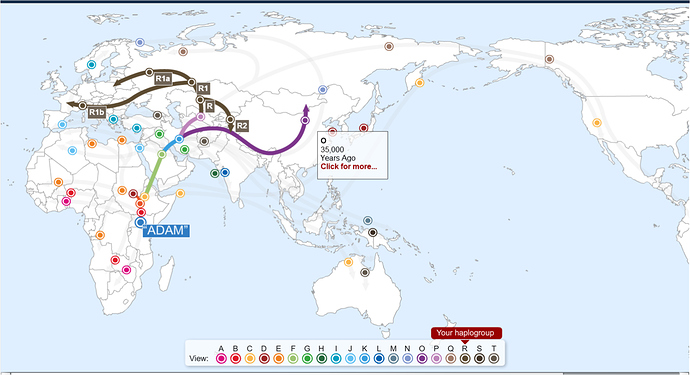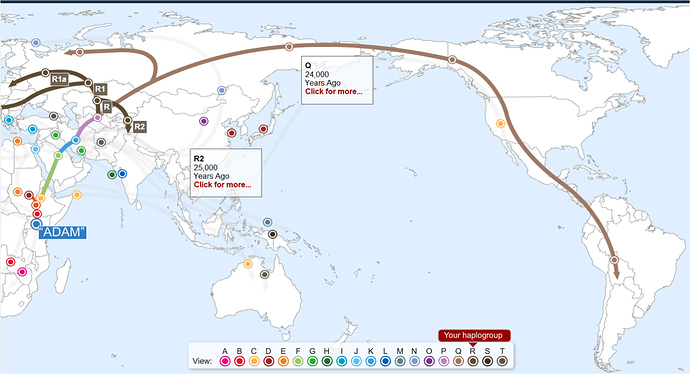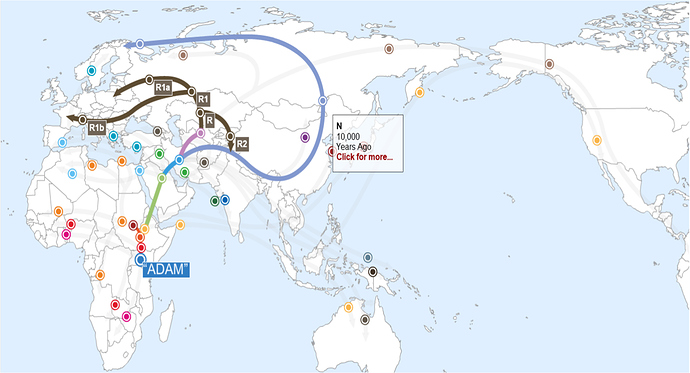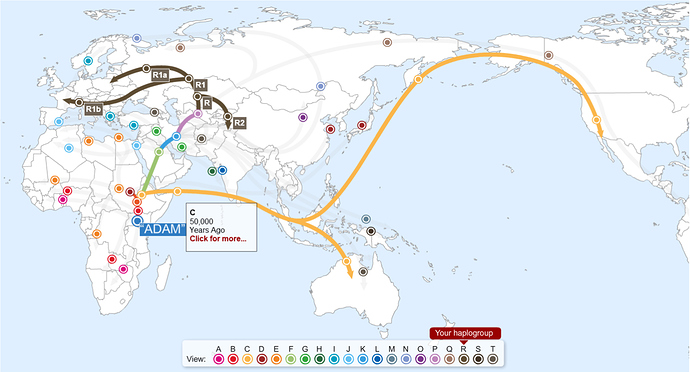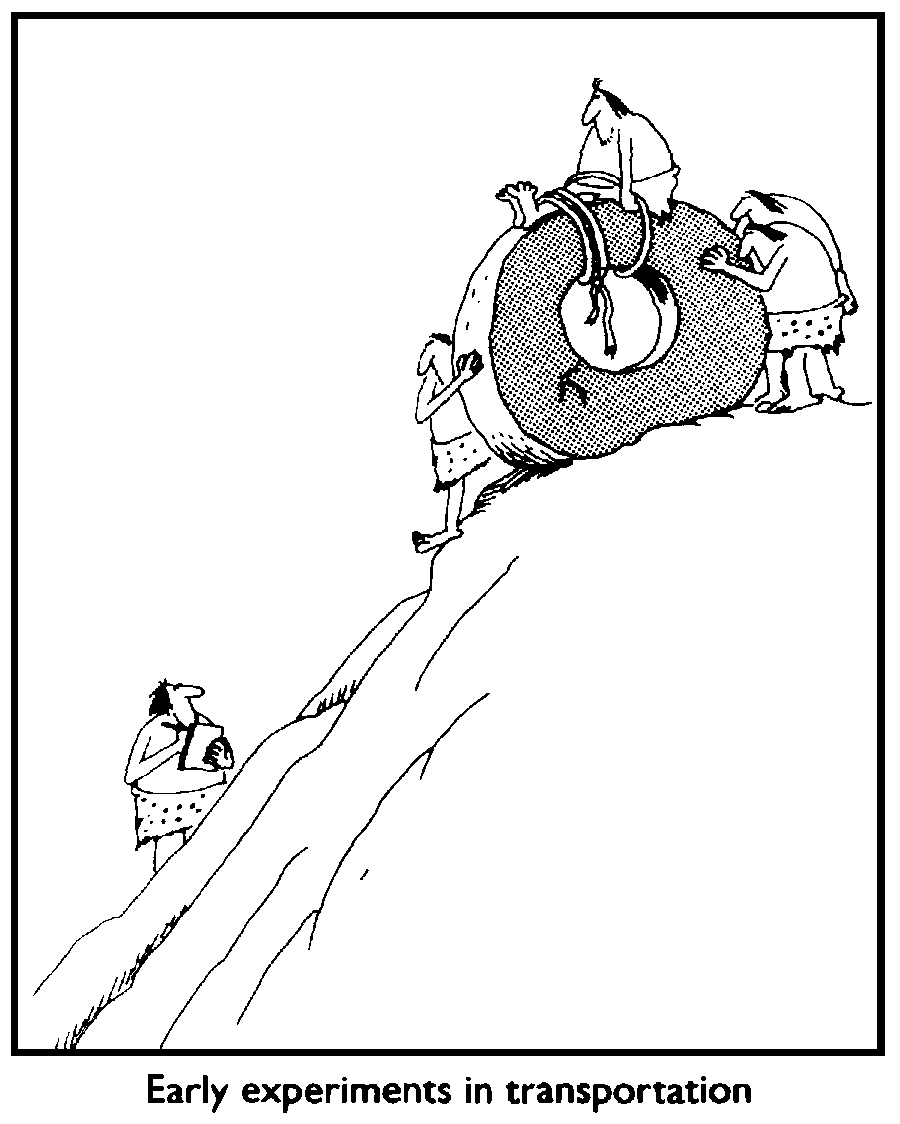Thanks for the clarification!!
Sigh, You are so wrong. No the native Americans were Siberians, NOT Chinese. Having lived in China with the Han and having learned their language (badly), I can assure you that Han are not the people who crossed the Bering straight. Really, you should check your facts before you proclaim them. Y chromosome data shown below comes from a site where I did a y-chromosome dna test. FTDNA. Haplogroup K split into many lineages out of Iran (the light blue dot in Iran)… You can see a light purple going north into Uzebekistan. This is haplogroup P which then splits into two lineages Haplogroup R (the European line) and the Siberian/Amerind line Q (brown dot). . The Han (Chinese and Haplogroup O dark purple.) came into china from a southerly route and split with Euro- Siberian/Amerinds line about 40 kyr ago. Then about 35kyr ago, Siberians/Amerinds and Europeans split apart and went different directions. After that the Siberian/Amerind lineage continued along on its own path, never touching the region later occupied by the Han.(type O and N(blue of Manchuria/Mongolia.) Haplogroup N represents a migration into China 10kyr ago. But they then turned west and went into Finland area. The second Amerind group, haplogroup c came out of Indonesia and again had nothing to do with China.
Mitch, it is very easy to say something and it is very time consuming for someone to try to show your the errors of your ways.
Edited to Add Amerind Haplogroup C which has nothing to do with the Han Chinese either.
The Amerinds have been in America for at least 16kyrs. Both the Vikings (failed colony) and the supposed Zheng He’s failed discovery of California (supposed Chinese anchors of Zheng He’s time have been found.) But some say they are natural objects of erosion. Zheng He was an amazing Admiral and I don’t know if he came to the Americas around 1421 or not. The claim is controversial. the maps you will see in support of this idea is a forgery in my estimation.
Thanks for the confirmation. The Indochinese (i.e. Haplogroup C) not the Han Chinese (which came so much later) did indeed discover America long before the Vikings DISCOVERED America even if the Vikings didn’t succeed in COLONIZING America. This remains true even if this was only after those from Siberia crossed the Bering strait and migrated all the way to South America. Of course this is all very theoretical, I would agree. And the principle point was that imagining that the Europeans were so special for discovering the Americas is ridiculous to the point of hilarity. Just because the Euro-whites managed to rape and steal so much more from the American people does not make them better than other people in world, not even a little bit.
Mitch said
The Chinese did discover America.
And after I show how wrong he is, he thanks me for confirmation ![]() I guess no fact will budge him.
I guess no fact will budge him.
[quote=“mitchellmckain, post:24, topic:42860”]
Thanks for the confirmation. The Indochinese (i.e. Haplogroup C) not the Han Chinese (which came so much later)
No, Mitch, it is not an ‘indochinsese’ group, That is Vietnam, Laos and Yunnan province China area, Haplogroup C is an INDONESIAN Group, which is NOT Han and NOT Indochinese. Sheesh, Even when the data doesn’t support either claim you seem to declare victory.
If all you are claiming victory about is that the Amerinds were in North America before the Vikings, I never made any claim that they were. So I don’t know whom you are talking to, but it isn’t me. Amerinds were here 16kyr ago, long before the Nordics became Vikings.
As to the Chinese being here in 1421, it is possible, but not proven.
Mostly I am just laughing my head off at people for the silly lines they draw and arbitrary distinctions they make.
Regardless… we are talking about migrations, where nobody lived in the middle of the ocean no matter how you draw those lines. SO… we are talking about people who lived in China on their way up to the Bering strait. AND I had this in mind from my very first comment about the Chinese discovering America. I hadn’t even heard about this claim regarding Zheng He before.
Whats fascinated is how the people in those ages started to think how could they use their environment around them to create things(such as tools). For example how did the human though the stone could make it a wheel ? It couldnt possibly just come to his mind like"Aha bingo i can use this to make wheels"
As @Klax’s alluded to above: “necessity being the mother of invention” And that concept packs a lot of punch. Most societies over history (unlike so many of us today) probably had much more immediate survival-oriented motivations driving their curiosities.
I know I’ve posted this Far Side favorite before … but I’ll shamelessly put it here again …
Experience is another thing i guess. But i dont think the early humans were like. Ohhh i need to travel or go somewhere well lets make it easier no. Their only concern was to eat and sleep and avoid dangerous predators.
And what about language? And how does that relate to the tower of Babel?
…though we should sell them too short on the desire to travel. There are plenty of survival reasons I suppose that might motivate one to travel … climate challenges, tribal enmities, intra-tribal strife etc. It fascinates me that Abram wasn’t the first in his family to just pick up and move. His father Terah had already pulled that move as well, so perhaps such opportunistic adventurism was already part of Abram’s experience, which might have helped him answer God’s call when that came.
I don’t think these migrations were a matter of moving on without leaving any population behind them. After all, these migrations took tens of thousands of years. Surely, this was the flow of excess population not nomads moving from place to place.
Yeap but keep in mind this was already after their first migration. Like the dorians that were a greek tribe sort of. They werent originaly in Greece but they migrated to there. So they didnt use the wheel to migrate again
Yeah, Genetics is such a farce of a science isn’t it, Mitch. I love how we Christians change science when it doesn’t fit our theology. We also ignore parts of the bible that don’t fit our theology as well. When we can chose what science we believe and when we can chose what Bible verses we can believe, then all theories whatsoever are possible. But those theories are mostly then, just figments of our imagination.
“How Europe Underdeveloped Africa” has historically been admired. I have only skimmed it, myself, but its premise deserved consideration.
Thanks.
I disagree.
Christians who disregard the findings from genetics to cling to anti-evolution distortions of the Bible are being willfully ignorant. Science is backed up by demonstrable evidence.
Thanks for the welcome, Mervin.
Since the question was about how human life developed through history, involving primitive technology, tribes and “the rest of humanity”, let me suggest further caution in embracing a secular story of human development. I can surely sympathize with Nickolaos’ language issue and appreciate his sentiment; it’s about more than just migration, but also innovation and worldview (e.g. mastery over nature, etc.). In the East, the shadow of Marxism prevailed, with a strong current of anthropological discrimination based on civlization and culture, quite different than the ethnic dimensions of power and struggle in the USA.
With Diamond, it’s only partly his pop star status & ties to corporate power. A bigger problem is what he gets wrong about Indigenous people and humankind in general, particularly regarding the conflict thesis, which appears to be based on his attachment to a “Darwinian” worldview approach. It’s surely not him alone, but there is a fairly clear pattern of dehumanization through technological determinism and a secular attempt at rehumanization (in a pagan or irreligious image) that shouldn’t be missed. See here: The myth of the "Brutal Savage" - Survival International
Leaving Diamond aside, perhaps you could instead suggest a devout religious or Christian author you’ve read that addresses “how things developed as they did”, since you and gbob recommend Diamond, while I do not? It would be valuable to hear who you’ve consulted that doesn’t restrict themselves to or depend upon a conflict narrative. I believe this secular irreligious approach exposes itself as civilizational discrimination, in the line of Darwin, Diamond, Pinker (The Better Angels of Our Nature), Harris (The End of Faith, Letter to a Christian nation), quite different from Francis Collins’ “The Language of God” as applied in human society and culture.
Frankly, as an Abrahamic monotheist, I don’t see how the “anthropological insights” of a secular, non-religious person make any sense to apply to my understanding of human beings. The irreligious anthropology, or anthroplogy as a substitute for religion, starts with a totally different base that denies being created by God. I guess a person of faith could embrace some profane aspects of Diamond’s anthropology, but the cost of doing so should be clear to them why they would do that to themselves.
Perhaps this helps communicate what I mean to convey about anthropology, though it avoids the technology dimension from Nick’s initial question, and also your well-taken point “We’re kinda stupid that way, and much more the slaves of technology, than the masters of anything.” This is a link to an article from the American Scientific Affiliation’s journal PSCF: “Why Are There So Few Christian Anthropologists? Reflections on the Tensions between Christianity and Anthropology”. https://www.asa3.org/ASA/PSCF/2006/PSCF12-06Arnold.pdf
Are there any anthropologists affiliated with the BioLogos Foundation? If not, why not?
Here are the Siberians related most closely to North American Amerindian language groups:
The only modern day remnant of that language group are the Ket people !:
Yeah - Diamond’s view is definitely informed by an evolutionary outlook - no arguments there. For those who are automatically threatened by or hypersensitive to the presence of any hint of “non-religious” world view (which I think is descriptive of Diamond), then his writings are probably not for you. But let me hasten to add that I don’t remember Diamond ever advancing “hostile-toward-religion” views either, beyond the obvious recounting of events in South America when the Catholic Spaniards encountered the indigenous peoples there. So I don’t recall that Diamond ever pushes the “conflict thesis” in the “science-vs-religion” context of that phrase that interests so many of us here.
But the “conflict thesis” you speak of - the use of conflict, violence, and warfare to help explain the development of civilizations through history - that does interest me, and is a potential concern. I do agree that one should not fall into either error of romanticizing ancient or contemporary, but isolated cultures, and nor should they be routinely assumed to be violent or brutal, -especially if that latter characterization is used in any way by an affluent majority to exploit them or impinge on their rights. I don’t know a lot about survivalinternational.org, but from perusing your links, I think I resonate with their concerns on behalf of threatened indigenous peoples generally. And if Diamond’s or Pinker’s views are used in any way to help support such oppression, then that is certainly a concern. I’ve not read “The World Until Yesterday” and so cannot praise or defend it here. But knowing Diamond’s prior works, I think it would be unfair to think he promotes any sort of imperialist or condescending attitudes that ‘civilized’ society has towards indigenous communities.
Surely there is a wide range of middle ground here? Rare (or nonexistent?) would be the group, ancient or contemporary, big or small, ‘civilized’ or not, that doesn’t have its shadow side it wouldn’t want held up for examination. Are we 21st century westerners violent - or from a violent culture? Most of us probably would love to think we aren’t, but that would not be the view of all. Native Americans, and other ‘minorities’ who have suffered at the hands of the powerful may have stories about our culture and its on-going history that the corporate, and economic and even educational powers-that-be would not want to see given as a last word on “who we all are”. Are there positive things that can be highlighted instead? Of course! But neither of those sides will be the whole story by itself.
So I guess my reaction to your concerns thus far is to note that no work (including Diamond’s) should be read uncritically. You are right about that. Nor is his work bereft of merit - a lot more than you give it credit for I think. Only knowing you from your words above, I feel invited to at least suspect that you are driven to promote a “conflict thesis” in an evolution vs. religion sense which might be driving you toward perfunctory dismissal of anything that makes free use of evolutionary insight (which Diamond certainly does). If so - I don’t resonate with concerns of that sort at all. I like to glean insights from all sorts of (necessarily imperfect) sources. Some farther from perfect than others. And I maintain that one could do a lot worse than reading Diamond.
Here is a Scientific American article that defends Diamond, but does not withhold criticism where this author feels it is due. I think it may be a more balanced reaction to Diamonds recent (2012) book.
This topic was automatically closed 6 days after the last reply. New replies are no longer allowed.
